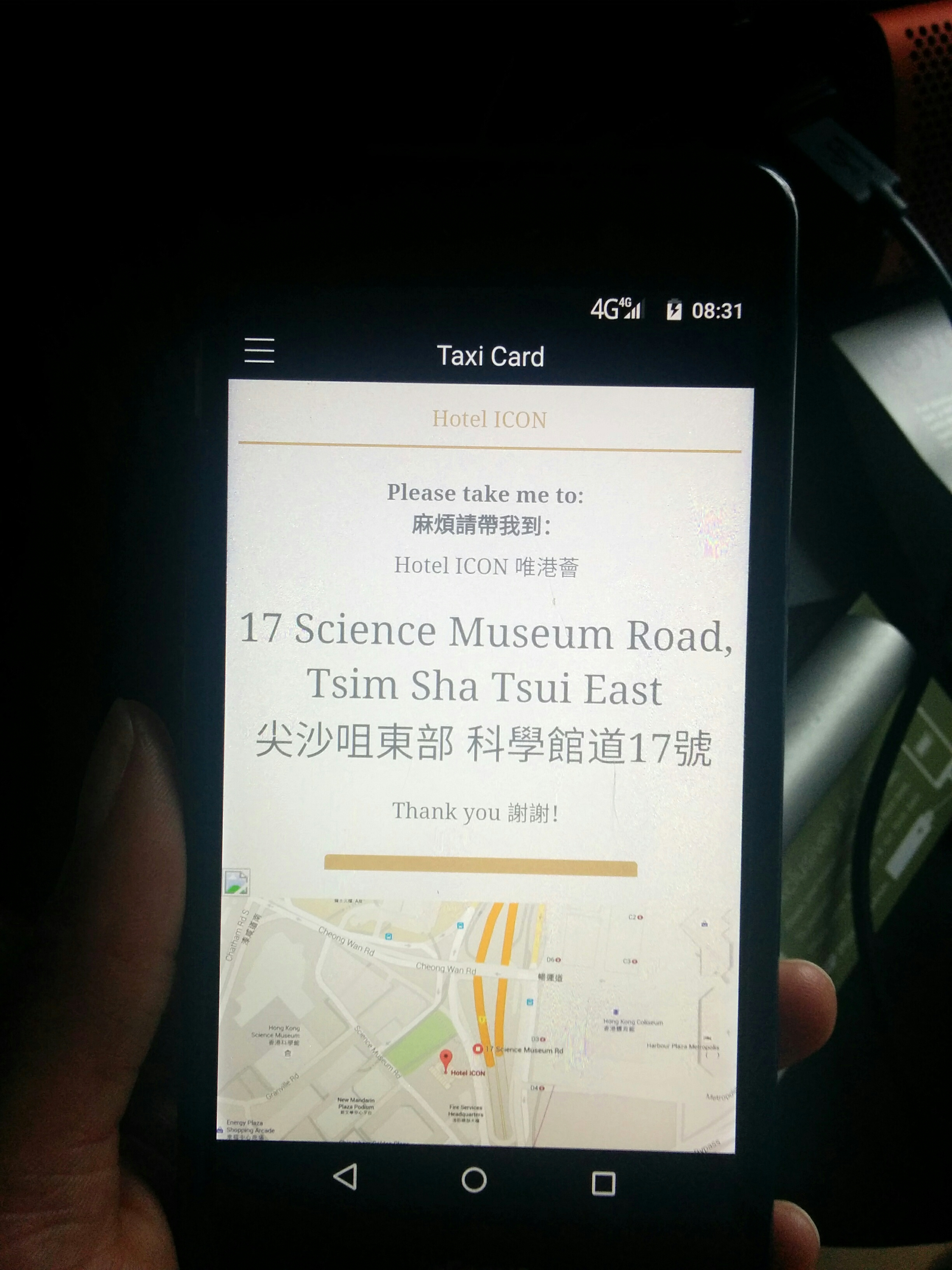Handyphone: Your pocket hotel and city guide
While in Hong Kong, I stayed at the Hotel Icon in Tsim Sha Tsui. It's a fantastic hotel that's run as a “learning laboratory” by students and faculty at The Hong Kong Polytechnic University as part of its School of Hotel & Tourism Management program.
Perhaps because it's a teaching hotel, Hotel Icon offers a couple of amenities that I haven't yet seen in the United States. One of those amenities is a smartphone in every room, known as the handy phone.
Handy phones are smartphones that run a heavily modified version of Android. These modifications prioritize hotel and city information, making the phone an electronic city guide. The lock screen displayed my room number. Thankfully it was in small-enough type that shoulder surfing was difficult.
Even though its Android installation is heavily modded, the Handy is still an Android device with access to the Google Play store. Many stock Android applications — such as the Clock application — come preloaded. Paired with a small Bluetooth speaker in each room, it's a nice alternative to the clock radio/old Apple device dock found at hotels in the United States.
What makes the handy phone a killer hotel amenity, however, is that it's removable and fits in your pocket or purse. Devices like Google Home or the Amazon Echo do not. I didn't bring a laptop on this trip, but if I had, I could have used its hotspot and 4G connectivity. handy is also preloaded with a phone application that lets guests make free calls to about 20 different countries including the United States. Mom was happy to hear from me.

My favorite feature though was also its simplest: the “taxi card” meant to be shown to the driver that displayed the hotel's name and address in both English and Chinese. Although much of Hong Kong is bilingual, you may meet taxi drivers who are not.
Handy phone also had Google Maps preloaded, as you might expect from a tourist-centered device. I also installed the MTR app to navigate Hong Kong's subway system. I could not, however, install updates to the MTR application without logging in to my Google account. Handy, to its credit, says that devices are wiped and reset after each guest checks out. I did not want to take the chance that they don't wipe well.
A trend?
This seems to be catching on in Asian hotels first. Friends report using similar devices in Singapore and at least one other Hong Kong hotel. Smartphone keys delivered using an application that you download to your own device are increasingly common in the United States. But to date, I don't know of any U.S. hotels that loan you smartphones or tablets.
My mobile plan comes with free international roaming, but in Hong Kong I was limited to (painfully slow, how did we ever use this?) 2G network speeds. Needless to say, I appreciated having a 4G device.
I suspect that travelers at U.S. hotels are usually domestic travelers with nationwide mobile calling and data plans. Handy is probably most useful for U.S. hotels that draw lots of international guests.
That said, I think more U.S. hotels would do well to add a smart device or appliance — a TV, phone, or tablet — to guest rooms. Calling a desk or filling out a form adds friction to room service ordering or spa service booking processes. I'd rather use a smart TV, remote and well-designed application. A bonus of using a device is that guests can book these things at 2 am while wrestling with jetlag-related insomnia.
Mitigating theft
If you put a US$500-700 pocket-sized device in every room, you might imagine that you'd end up with a lot of “lost” phones. Handy says it does a few things to mitigate that.
- The phone only works with a handy SIM card.
- Stealing the SIM won't work; it's designed to work with the handy.
- Its SIM card is restricted by location. I lost connectivity in Macau, which sits just across the Pearl River.
I'm not a telephone network or hardware expert. I assume it's possible to limit a SIM to a particular device, and a device to a SIM. I assume that handy is doing this correctly.
Besides, the hotel has your credit card number on file. If you break the phone (or “lose” it), you'll buy it.
Security? Privacy?
Though it's convenient as heck, I did have a few concerns about using the handy phone.
- Is it logging which phone number(s) I call?
- Is it logging my network traffic?
- Is it logging my keystrokes?
- With what parties is it sharing my (GPS or tower) location data?
- Are the camera or microphone being activated remotely?
- Is the secure wipe really secure and thorough?
However, these are concerns are ones I have about any device that has a microphone, camera, and internet/data connection. Without auditing the device in your room, you can't know for sure. As a small precaution, while in the room, I put the phone in its stand and turned it away from the bed, and bathroom door.